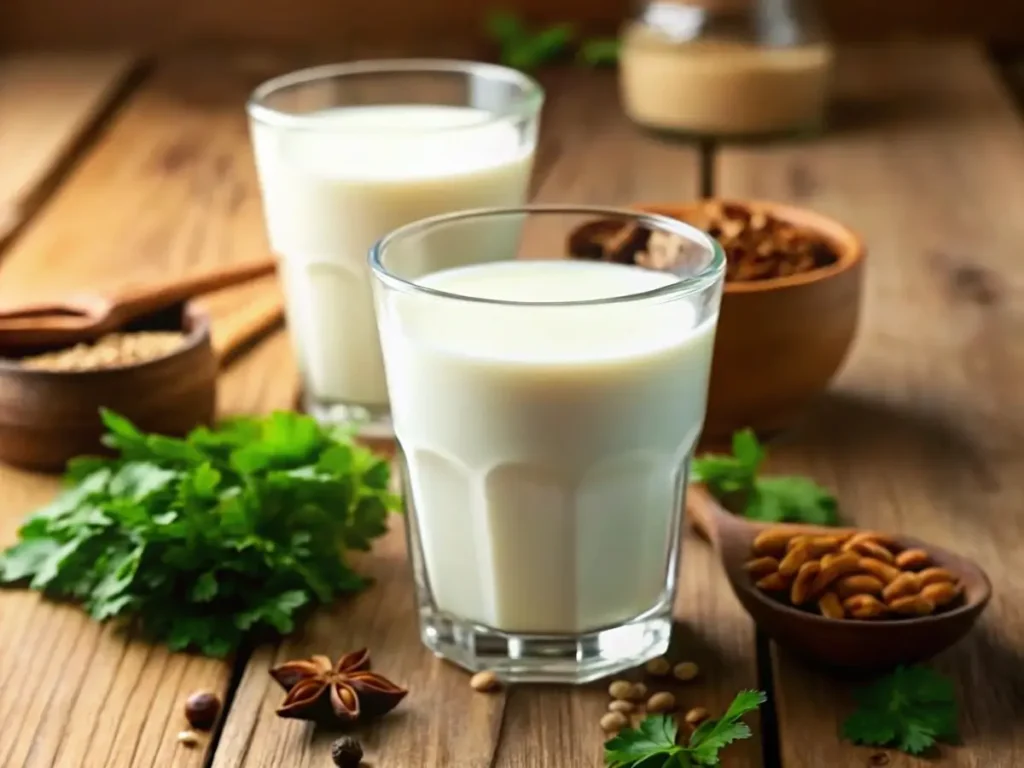Have you ever wondered, “Does buttermilk put good bacteria in your gut?” If so, you’re not alone! Buttermilk is more than just a tangy drink—it’s a powerhouse of probiotics, vitamins, and minerals that support digestion and gut health.
But does it really introduce beneficial bacteria to your system? Let’s break down the science behind buttermilk and its role in maintaining a healthy gut microbiome.
Table of Contents
Key Takeaways
- Buttermilk contains probiotics that help balance gut bacteria.
- It supports digestion, reducing bloating and acidity.
- Rich in calcium & vitamin B12, it nourishes bones & metabolism.
- Lowers cholesterol and boosts immunity.
- Comparing buttermilk vs. yogurt & kefir reveals unique benefits.
Does Buttermilk Put Good Bacteria in Your Gut? Understanding Probiotic Power

Probiotic Content
Does buttermilk put good bacteria in your gut? The answer is YES! Buttermilk is not just a refreshing drink; it’s packed with probiotics that support digestion and gut flora balance. By drinking buttermilk daily, you can increase the good bacteria in your gut, improve digestion, and reduce bloating. This natural source of probiotics can be a game-changer for your gut health, aiding in the balance of your gut flora and potentially easing digestive discomforts.
Vitamins and Minerals
Not only is buttermilk rich in probiotics, but it also packs a punch with its vitamins and minerals. Here’s a quick rundown of what’s in a typical 100-gram serving:
| Nutrient | Amount |
|---|---|
| Energy | 40 kcal |
| Protein | 3.31 g |
| Calcium | 116 mg |
| Phosphorus | 89 mg |
| Potassium | 151 mg |
| Riboflavin | 0.154 mg |
| Pantothenic Acid | 0.275 mg |
These nutrients are crucial for various bodily functions. Calcium and phosphorus, for instance, are vital for bone health, while potassium helps maintain fluid balance in the body. With its low-calorie count and high nutrient density, buttermilk is a smart choice for those looking to boost their nutritional intake without adding extra calories.
How Does Buttermilk Help Gut Flora?
Maintaining Gut Flora Equilibrium
Buttermilk is not just a tasty drink; it’s packed with probiotics that help keep your gut flora in check. These friendly bacteria are like tiny helpers, balancing the good and bad bacteria in your gut. This balance is super important because it affects everything from your digestion to your immune system. When your gut flora is balanced, you’re less likely to experience digestive issues like bloating or constipation. Think of it as a natural way to keep your gut running smoothly.
- Probiotics: These are the good bacteria in buttermilk that help balance your gut.
- Lactic Acid: This helps to maintain the right pH levels in your gut, making it a friendly environment for good bacteria.
- Regular Consumption: Drinking buttermilk regularly can help sustain this balance over time.
Preventing Gastrointestinal Ailments
Buttermilk doesn’t just stop at balancing your gut flora; it also helps protect against some gut-related issues. The probiotics in buttermilk can reduce harmful bacteria, which might otherwise lead to problems like ulcers or infections. Lactobacillus species found in buttermilk can combat pathogens like Helicobacter pylori, a bacterium linked to gastric ulcers.
- Reduces Harmful Bacteria: Probiotics in buttermilk can decrease the number of bad bacteria in your gut.
- Enhances Digestion: By breaking down food more efficiently, buttermilk can help you absorb nutrients better.
- Supports Regularity: The probiotics and lactic acid in buttermilk may promote healthy bowel movements.
Drinking buttermilk is like giving your gut a helping hand. It’s a simple, natural way to support your digestive health and prevent issues before they start.
Incorporating buttermilk into your diet could be a game-changer for your gut health. Whether you’re sipping it straight or adding it to recipes, it’s a delicious way to keep your gut flora happy and healthy. And if you’re interested in how buttermilk can restore normal receptor levels and prevent disruptions, check out this study for more insights.
5 Health Benefits of Buttermilk for Digestion
Buttermilk is more than just a refreshing drink; it offers a range of health benefits that make it a great addition to your diet. Let’s break down some of the key advantages:
- Heart Health: Regular consumption of buttermilk can help manage cholesterol levels, which is crucial for maintaining heart health. It contains sphingolipid compounds that can prevent the absorption of cholesterol in your intestines, thus helping to lower LDL cholesterol levels.
- Cancer Prevention: Some studies have indicated that buttermilk may have anticancer properties. Certain proteins and bioactive lipids in buttermilk can inhibit the growth of cancer cells and even induce apoptosis, or programmed cell death, in these cells.
- Digestive Aid: The probiotics found in buttermilk are beneficial for your digestive system. These good bacteria help maintain a healthy balance of microorganisms in your gut, which can ease digestion and prevent gastrointestinal discomfort.
- Hydration and Cooling: With its high water content and electrolytes like potassium, buttermilk helps keep you hydrated. It’s particularly effective in cooling the body, making it an excellent choice for hot weather or after a spicy meal.
- Energy Boost: Buttermilk is rich in vitamin B12, which plays a role in converting food into energy. This makes it a good option for those needing a natural energy boost throughout the day.
- Bone Health: Packed with calcium and phosphorus, buttermilk supports strong bones and teeth. This is especially important for reducing the risk of osteoporosis.
- Skin Benefits: The lactic acid in buttermilk acts as a gentle exfoliant, helping to brighten and smooth the skin.
- Immune Support: By promoting a healthy gut microbiome, buttermilk indirectly supports your immune system.
Buttermilk is a powerhouse of nutrients that not only supports your digestive health but also offers benefits ranging from heart health to glowing skin. Incorporating this tangy drink into your daily routine can contribute to overall wellness.
Incorporating Buttermilk into Your Diet
Recipe Ideas
Buttermilk is a versatile ingredient that can jazz up your meals in unexpected ways. Here are some tasty ideas to try:
- Smoothies and Shakes: Add buttermilk to your morning smoothie for a creamy texture and a probiotic punch. Mix it with fruits like bananas or berries and a touch of honey for a refreshing start to your day.
- Salad Dressings: Use buttermilk as a base for creamy salad dressings. Blend it with herbs, lemon juice, and spices to create a tangy dressing that adds a nutritious twist to your greens.
- Baked Goods: Incorporate buttermilk into your pancake or waffle batter. It not only adds moisture but also enhances the flavor, making your breakfast both delicious and healthy.
- Marinades and Curries: Use buttermilk as a marinade for meats and vegetables. Its acidity helps tenderize, while its probiotics aid digestion. It can also be added to curries to enhance creaminess and balance spicy flavors.
- Chilled Soups: Prepare chilled soups, like cucumber or tomato, and incorporate buttermilk for a creamy texture and refreshing taste. This is particularly enjoyable during the hot summer months.
Daily Consumption Tips
Incorporating buttermilk into your daily routine can be simple and rewarding. Here are some tips to make it a regular part of your diet:
- Morning Boost: Start your day with a glass of buttermilk to kickstart your metabolism and boosts gut. Add a pinch of salt and cumin for flavor and digestive benefits.
- Post-Workout Recovery: Enjoy a glass of buttermilk after exercise. Its easily digestible proteins aid muscle repair and recovery.
- Cooling Drink: Sip on buttermilk during hot weather or after a spicy meal. Its natural soothing effect can help regulate body temperature and provide relief from heat.
Pro tip: Buttermilk is not just a tasty addition to your meals; it’s a probiotic-rich beverage that aids digestion and boosts gut health. Regular consumption can enhance your energy levels and support a healthy lifestyle.
By creatively adding buttermilk to your diet, you can enjoy its health benefits while enhancing the flavors of your meals.
If you’re using buttermilk in savory recipes, avoiding common mistakes can enhance the final dish. Learn tips from Why Did My Chicken Pot Pie Come Out Watery?.
Does Buttermilk Work Better Than Yogurt & Kefir for Gut Health?
Buttermilk vs. Yogurt
When it comes to choosing between buttermilk and yogurt, it often boils down to personal preference and dietary needs. Both buttermilk and yogurt are rich in probiotics, which are beneficial bacteria that support gut health. While yogurt is thicker and often consumed with a spoon, buttermilk is more liquid and can be easily drunk. Yogurt generally contains a higher concentration of probiotics compared to cultured buttermilk, which is more commonly found in stores. However, traditional buttermilk, which is the liquid leftover from butter churning, does contain live cultures similar to yogurt. In terms of nutritional content, both are excellent sources of calcium and protein, making them great options for maintaining bone health.
Exploring the world of fermented foods can be a delightful journey for your taste buds and a boon for your gut health. Each of these foods brings something unique to the table, from taste to nutritional benefits. Whether you choose cultured buttermilk, yogurt, or kefir, you’re making a choice that supports your digestive well-being.
While kefir is often lauded for its diverse probiotic strains, buttermilk holds its own with unique health benefits. Is Buttermilk as Good as Kefir for Probiotics dives deeper into their differences.
Buttermilk vs. Kefir
Kefir is another fermented dairy product that often gets compared to buttermilk. Kefir has a tangier taste and a thinner consistency than yogurt but is thicker than buttermilk. One of the standout features of kefir is its probiotic content; it typically contains a wider variety of probiotic strains than buttermilk or yogurt. This makes kefir a powerhouse for those looking to boost their gut flora diversity. People with lactose intolerance might find kefir easier to digest due to its fermentation process, which breaks down much of the lactose. On the other hand, buttermilk is often lower in fat and calories, making it a lighter option for those watching their intake.
For those exploring fermented options, Is It Okay to Drink Kefir Milk Every Day? offers a closer look at kefir’s daily consumption benefits compared to buttermilk.
Understanding Buttermilk’s Acidity and Alkalinity
pH Levels and Gut Health
Buttermilk is often celebrated for its unique balance of acidity and alkalinity, which plays a significant role in gut health. The pH level of buttermilk typically ranges from 4.4 to 4.8, making it slightly acidic. This acidity is primarily due to lactic acid produced during fermentation. However, despite its acidic nature, buttermilk can have an alkalizing effect on the body once consumed. This paradoxical effect is because the body metabolizes the acids in buttermilk, resulting in alkaline by-products.
- Balances Stomach Acid: Buttermilk can help neutralize excess stomach acid, offering relief from conditions like heartburn and indigestion.
- Promotes Digestive Health: Its acidity aids in the breakdown of food, enhancing nutrient absorption and supporting a healthy digestive tract.
- Supports Probiotic Growth: The acidic environment fosters the growth of probiotics, beneficial bacteria that play a crucial role in maintaining gut flora.
Myths about Buttermilk Consumption
There are several myths surrounding buttermilk and its consumption. One common misconception is that its acidity can worsen stomach ulcers. In reality, the probiotics and lactic acid in buttermilk can help soothe and heal the stomach lining.
- Myth: Buttermilk is too acidic for daily consumption.
- Fact: Regular consumption of buttermilk can actually support a balanced gut environment.
- Myth: It should be avoided if you have lactose intolerance.
- Fact: The fermentation process in buttermilk reduces lactose levels, making it easier to digest for many people.
- Myth: Drinking buttermilk can lead to weight gain.
- Fact: Buttermilk is low in calories and fat, making it a suitable option for weight management.
Drinking buttermilk regularly can be a refreshing way to support your digestive health. It not only aids in digestion but also helps maintain a balanced pH level in your body, contributing to overall wellness.
Conclusion: The Importance of Buttermilk for Gut Health

When it comes to gut health, buttermilk stands out as a simple yet effective choice. Packed with probiotics, it helps maintain the delicate balance of gut flora, which is crucial for digestion and overall health. By introducing beneficial bacteria, buttermilk can aid in reducing harmful bacteria, thereby promoting a healthier gut environment.
Buttermilk isn’t just about probiotics. It’s also a source of essential nutrients like calcium and vitamin B12, which are important for those on vegetarian or vegan diets. The presence of these nutrients supports various bodily functions beyond just gut health.
Incorporating buttermilk into your diet can be as easy as enjoying it as a refreshing drink or using it in recipes. Its versatility makes it a valuable addition to daily meals, whether you’re using it in marinades, soups, or baked goods.
A well-balanced gut can enhance your immune system significantly, highlighting the role of gut health in overall well-being.
To wrap up, buttermilk offers a natural, tasty way to support your digestive health and more. If you’re looking for a simple dietary change with multiple benefits, buttermilk might just be the answer. For more on how buttermilk can benefit your digestive health, consider adding it to your daily routine.
Frequently Asked Questions
Does buttermilk put good bacteria in your gut?
Yes, buttermilk is great for gut bacteria! It is a natural source of probiotics, which are beneficial microorganisms that support a healthy gut microbiome. Probiotics help balance the good and bad bacteria in your digestive system, improving digestion and overall gut health.
How does buttermilk improve gut bacteria?
Drinking buttermilk daily can offer several health benefits. It can improve digestion, reduce acidity, and help regulate bowel movements. The good bacteria in buttermilk, such as Lactobacillus, help balance your gut microbiome, promoting better digestion and overall gut health. Thanks to its cooling properties and probiotics, it can also reduce inflammation in the stomach lining and support a healthy immune system. However, like any food, moderation is key.
Does buttermilk have healing properties?
Yes, buttermilk has healing properties, especially for the digestive system. It can soothe an upset stomach, combat indigestion, and reduce symptoms of acidity. Additionally, it is rich in essential nutrients like calcium, vitamins, and proteins, which contribute to overall well-being. Its anti-inflammatory properties may also aid in managing conditions like irritable bowel syndrome (IBS).
Is buttermilk a better probiotic than yogurt for gut health?
Buttermilk and yogurt both contain probiotics, but the amount and types of probiotics can vary depending on how they are made. Traditional buttermilk (made by fermenting milk) often contains more diverse strains of probiotics compared to some commercial yogurts. However, the specific probiotic content depends on the brand or preparation method of each product.
